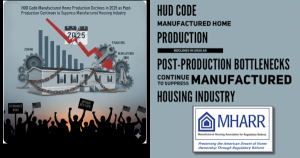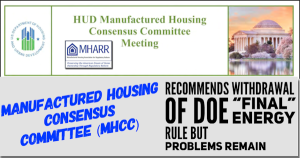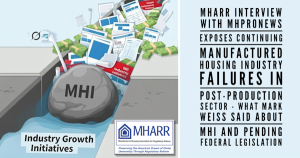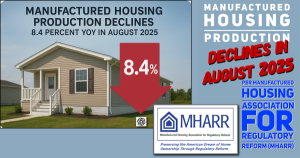MHARR Washington Update – Fannie, Freddie And DTS Plus Latest Concerns On MHI Energy Litigation
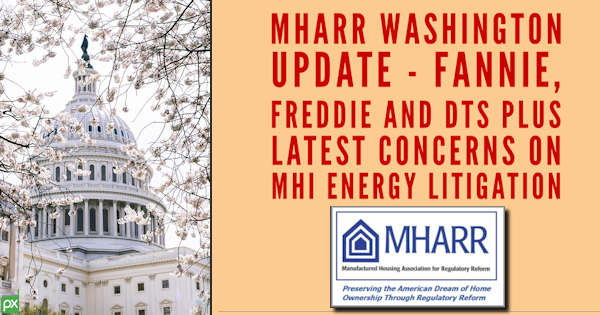
MHARR WASHINGTON UPDATE
The Manufactured Housing Association for Regulatory Reform is a Washington D.C.-based national trade association representing the views and interests of producers of manufactured housing
REPORT AND ANALYSIS
IN THIS REPORT: JUNE 22, 2023
- FANNIE AND FREDDIE RUNNING OUT OF EXCUSES ON DTS
- LATEST CONCERNS ABOUT MHI ENERGY LITIGATION
MHARR PRESSES DTS CHATTEL IN MEETING WITH FHFA DIRECTOR
In a June 20, 2023 meeting with Federal Housing Finance Agency (FHFA) Director Sandra Thompson, MHARR Washington officials once again pressed for immediate FHFA action to require Fannie Mae and Freddie Mac to fully comply with the statutory Duty to Serve (DTS) mandate by providing market-significant securitization and secondary market support for manufactured housing personal property (chattel) loans.
MHARR reminded the Director that nearly 80% of all new HUD Code homes sold today are financed as chattel and that chattel loans help lower and moderate-income families across the nation access the industry’s most affordable homes, thereby advancing housing equity. DTS support for chattel loans would draw more lenders into the manufactured housing market, providing more choices for borrowers, while greater competition and reduced risk would result in lower interest rates for consumers.
By contrast, in the absence of DTS chattel support – with not one manufactured home chattel loan purchased or securitized by Fannie Mae or Freddie Mac in the 15 years since the enactment of the statutory DTS mandate — manufactured housing consumers are needlessly forced to deal with industry-dominant lenders charging higher-than-necessary interest rates that have been previously characterized as “predatory.” This has been further compounded by HUD’s continuing failure to fully and properly implement and enforce the “enhanced federal preemption” provision of the 2000 Reform Law, which has allowed zoning discrimination and exclusion to persist against manufactured homes and manufactured housing consumers with devastating consequences for the industry and those consumers. Together, these two factors have kept millions of Americans out of the affordable manufactured housing market, while simultaneously limiting production and the growth potential of the entire industry as reflected by lower average manufactured housing production over the past decade-plus and the severe decline in manufactured housing production (now worse than -30%) over the last two quarters.
MHARR pointed out that DTS specifically recognizes the crucial role of manufactured home chattel loans, and expressly authorizes Fannie and Freddie to include chattel loans within their manufactured home support programs. Fannie and Freddie, however, over the course of the 15 years since enactment of DTS, have paid lip service to support for manufactured home chattel loans and have even proposed various chattel “pilot” programs, only to withdraw those programs before their implementation.
In virtually every instance, Fannie and Freddie, with FHFA’s perceived blessing, have claimed that they lack access to “performance” information regarding chattel loans and the risks that might be associated with such loans.
The reality, however, is that the industry-dominant lenders, without the secondary market and/or securitization support of Fannie or Freddie, have made a profitable enterprise of manufactured home personal property loans. Obviously, if those loans produced excessive numbers of defaults or late payments, risk-averse private lenders would not originate them. Consequently, the very fact that manufactured home chattel loans have consistently accounted for nearly 80% of the manufactured home consumer finance market, shows that such loans can be made safely and securely – and can be supported safely and securely by Fannie and Freddie – all as required by federal law.
Put differently, the time is long past for Fannie and Freddie to stop their ongoing pattern of complaining, obfuscation, excuses and delay over DTS implementation in general and specifically over the alleged lack of performance data for manufactured home chattel loans, and do what DTS affirmatively requires, by initiating support for those loans and then building that support to market-significant levels as envisioned by DTS and its congressional proponents.
Among other suggestions, MHARR representatives urged FHFA to press Fannie Mae and Freddie Mac to factually and specifically explain any remaining problems they have with the DTS congressional mandate, in order to be addressed and resolved immediately. The reality, though, is that every day of further delay needlessly harms American consumers of affordable housing and undermines housing equity, contrary to the policies of the Biden Administration.
IS MHI BACKING AWAY FROM ENERGY LITIGATION?
In the belated court action filed by MHI (as urged by MHARR continually since May 2022) against the U.S. Department of Energy (DOE) with respect to DOE’s May 31, 2022 final manufactured housing energy standards rule, the parties have filed a “Joint Advisory” (copy attached) which asks the court to dismiss MHI’s Motion to Stay the DOE final rule and also indicates that the parties are “actively” engaged in ongoing “discussions” regarding the future course of that litigation.
While the dismissal, without prejudice, of MHI’s stay motion is not surprising in light of DOE’s extension of the compliance date for the May 31, 2022 final rule, pending the development of enforcement, testing and regulatory compliance regulations and, presumably, a new cost-benefit analysis, taking the added cost of those regulations into account, the industry should – and must – be wary of any type of agreed “course of action” that would either leave the May 31, 2022 rule in effect or otherwise concede or forfeit any of the industry’s arguments against the validity of that final standard.
As MHARR has long maintained (and published), the DOE May 31, 2022 final rule, based on the 2021 International Energy Conservation Code (IECC), is not an appropriate or legitimate standard for manufactured homes which, according to federal law, must be preserved as an affordable source of housing and homeownership. Instead, the DOE rule, under any scenario – and particularly with the added costs of enforcement, testing and regulatory compliance factored-in – would needlessly and substantially raise the purchase price of manufactured housing while simultaneously excluding millions of Americans from access to the only form of homeownership they can afford. For those consumers needlessly excluded from the housing market, there would be no offsetting benefits and no benefits whatsoever from the final rule.
As MHARR has consistently maintained, rather than negotiating over the scope and reach of a rule that is fundamentally tainted, fundamentally inappropriate for manufactured housing, and fundamentally destructive of the manufactured housing market, the industry should aggressively oppose that rule while working to force DOE “back to the drawing board” for a legitimate rulemaking process tailored to the specific needs and realities of the affordable manufactured housing market.
MHARR is a Washington D.C.-based national trade association representing the views and interests of independent producers of federally-regulated manufactured housing.
The “MHARR Washington Update” is available for re-publication in whole or in part without further permission and with proper attribution to MHARR.
Attachment

MHARR WASHINGTON UPDATE
The Manufactured Housing Association for Regulatory Reform is a Washington D.C.-based national trade association representing the views and interests of producers of manufactured housing
REPORT AND ANALYSIS
IN THIS REPORT: JUNE 22, 2023
- FANNIE AND FREDDIE RUNNING OUT OF EXCUSES ON DTS
- LATEST CONCERNS ABOUT MHI ENERGY LITIGATION
MHARR PRESSES DTS CHATTEL IN MEETING WITH FHFA DIRECTOR
In a June 20, 2023 meeting with Federal Housing Finance Agency (FHFA) Director Sandra Thompson, MHARR Washington officials once again pressed for immediate FHFA action to require Fannie Mae and Freddie Mac to fully comply with the statutory Duty to Serve (DTS) mandate by providing market-significant securitization and secondary market support for manufactured housing personal property (chattel) loans.
MHARR reminded the Director that nearly 80% of all new HUD Code homes sold today are financed as chattel and that chattel loans help lower and moderate-income families across the nation access the industry’s most affordable homes, thereby advancing housing equity. DTS support for chattel loans would draw more lenders into the manufactured housing market, providing more choices for borrowers, while greater competition and reduced risk would result in lower interest rates for consumers.
By contrast, in the absence of DTS chattel support – with not one manufactured home chattel loan purchased or securitized by Fannie Mae or Freddie Mac in the 15 years since the enactment of the statutory DTS mandate — manufactured housing consumers are needlessly forced to deal with industry-dominant lenders charging higher-than-necessary interest rates that have been previously characterized as “predatory.” This has been further compounded by HUD’s continuing failure to fully and properly implement and enforce the “enhanced federal preemption” provision of the 2000 Reform Law, which has allowed zoning discrimination and exclusion to persist against manufactured homes and manufactured housing consumers with devastating consequences for the industry and those consumers. Together, these two factors have kept millions of Americans out of the affordable manufactured housing market, while simultaneously limiting production and the growth potential of the entire industry as reflected by lower average manufactured housing production over the past decade-plus and the severe decline in manufactured housing production (now worse than -30%) over the last two quarters.
MHARR pointed out that DTS specifically recognizes the crucial role of manufactured home chattel loans, and expressly authorizes Fannie and Freddie to include chattel loans within their manufactured home support programs. Fannie and Freddie, however, over the course of the 15 years since enactment of DTS, have paid lip service to support for manufactured home chattel loans and have even proposed various chattel “pilot” programs, only to withdraw those programs before their implementation.
In virtually every instance, Fannie and Freddie, with FHFA’s perceived blessing, have claimed that they lack access to “performance” information regarding chattel loans and the risks that might be associated with such loans.
The reality, however, is that the industry-dominant lenders, without the secondary market and/or securitization support of Fannie or Freddie, have made a profitable enterprise of manufactured home personal property loans. Obviously, if those loans produced excessive numbers of defaults or late payments, risk-averse private lenders would not originate them. Consequently, the very fact that manufactured home chattel loans have consistently accounted for nearly 80% of the manufactured home consumer finance market, shows that such loans can be made safely and securely – and can be supported safely and securely by Fannie and Freddie – all as required by federal law.
Put differently, the time is long past for Fannie and Freddie to stop their ongoing pattern of complaining, obfuscation, excuses and delay over DTS implementation in general and specifically over the alleged lack of performance data for manufactured home chattel loans, and do what DTS affirmatively requires, by initiating support for those loans and then building that support to market-significant levels as envisioned by DTS and its congressional proponents.
Among other suggestions, MHARR representatives urged FHFA to press Fannie Mae and Freddie Mac to factually and specifically explain any remaining problems they have with the DTS congressional mandate, in order to be addressed and resolved immediately. The reality, though, is that every day of further delay needlessly harms American consumers of affordable housing and undermines housing equity, contrary to the policies of the Biden Administration.
IS MHI BACKING AWAY FROM ENERGY LITIGATION?
In the belated court action filed by MHI (as urged by MHARR continually since May 2022) against the U.S. Department of Energy (DOE) with respect to DOE’s May 31, 2022 final manufactured housing energy standards rule, the parties have filed a “Joint Advisory” (copy attached) which asks the court to dismiss MHI’s Motion to Stay the DOE final rule and also indicates that the parties are “actively” engaged in ongoing “discussions” regarding the future course of that litigation.
While the dismissal, without prejudice, of MHI’s stay motion is not surprising in light of DOE’s extension of the compliance date for the May 31, 2022 final rule, pending the development of enforcement, testing and regulatory compliance regulations and, presumably, a new cost-benefit analysis, taking the added cost of those regulations into account, the industry should – and must – be wary of any type of agreed “course of action” that would either leave the May 31, 2022 rule in effect or otherwise concede or forfeit any of the industry’s arguments against the validity of that final standard.
As MHARR has long maintained (and published), the DOE May 31, 2022 final rule, based on the 2021 International Energy Conservation Code (IECC), is not an appropriate or legitimate standard for manufactured homes which, according to federal law, must be preserved as an affordable source of housing and homeownership. Instead, the DOE rule, under any scenario – and particularly with the added costs of enforcement, testing and regulatory compliance factored-in – would needlessly and substantially raise the purchase price of manufactured housing while simultaneously excluding millions of Americans from access to the only form of homeownership they can afford. For those consumers needlessly excluded from the housing market, there would be no offsetting benefits and no benefits whatsoever from the final rule.
As MHARR has consistently maintained, rather than negotiating over the scope and reach of a rule that is fundamentally tainted, fundamentally inappropriate for manufactured housing, and fundamentally destructive of the manufactured housing market, the industry should aggressively oppose that rule while working to force DOE “back to the drawing board” for a legitimate rulemaking process tailored to the specific needs and realities of the affordable manufactured housing market.
MHARR is a Washington D.C.-based national trade association representing the views and interests of independent producers of federally-regulated manufactured housing.
The “MHARR Washington Update” is available for re-publication in whole or in part without further permission and with proper attribution to MHARR.
Attachment


